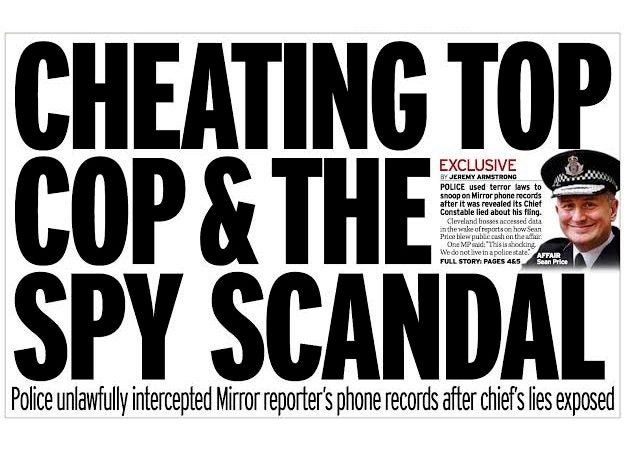
Daily Mirror journalist Jeremy Armstrong has been confirmed as the latest journalist targeted by police using spying powers to track down sources of information leaks.
Armstrong’s number was included as part of an application to access phone records made under the Regulation of Investigatory Powers Act (RIPA) by Cleveland Police in 2012.
Despite being included in the data grab, Armstrong is not named on RIPA documents, seen by Press Gazette.
Instead his number can be seen next to the name of Echo reporter Chris Webber, one of three Echo journalists targeted by the force alongside Julia Breen and Graeme Hetherington.
Armstrong was known to Cleveland Police for having written a number of stories about the force, including coverage of its chief constable, Sean Price, who was sacked for gross misconduct.
The force has said it can “neither confirm nor deny” its actions in regards to the use of RIPA. It is not known whether it deliberately targeted Armstrong or used the wrong number by accident.
The Mirror is understood to be taking legal advice on whether to bring its own case to the IPT, which rules on whether police have abused human rights in their use of surveillance powers.
On Thursday last week, a panel of judges indicated they would find Cleveland Police to have acted unlawfully in grabbing the phone records of former officers (and media sources) Mark Dias and Steve Matthews.
The force has already admitted that it unlawfully obtained landline and mobile calls going in and out for Hetherington, Breen and solicitor Alan Samuels over 17 days.
It also monitored the switchboard at the Echo, spying on every call going in and out over a 48-hour period (looking at the metadata of who called who and when).
A spokesperson for Cleveland Police said: “We have fully cooperated with the Investigatory Powers Tribunal process and await the determination of the panel in the coming weeks.”
Following the hearing, MPs have called for a “full review” into the force’s used of RIPA.
Shadow home secretary Yvette Cooper has also spoken out to condemn police use of snooping powers to target journalists.
She told the Mirror: “Communications data powers exist so the police can investigate serious crimes, not so they can prevent journalists holding them to account.
“In a democracy the freedom of the Press is incredibly important and needs to be protected not undermined.”
Cleveland Police’s data grab was carried out before Press Gazette’s campaigning helped to bring about a change in the law, meaning police now must seek judicial approval for applications to view telecoms data which could identify a journalistic source.
Prior to the introduction of the Save Our Sources amendment last year, police signed these off these request themselves.
The Interception of Communications Commissioner revealed in February 2015 that police forces around the country had used RIPA to access the call records of 82 journalists over the previous three years in order to identify their sources.
The Commissioner has never revealed which forces, or journalists, were involved.
Successive attempts by Press Gazette to find out more information about police surveillance of journalists using the Freedom of Information Act have been rebuffed by police forces around the UK.
Other examples of police forces known to have abused surveillance powers in order to find journalists’ sources include the following:
- The Met Police accessed the calls records of three Sun journalists and The Sun newsdesk in order to find out which officers leaked information about the September 2012 Plebgate incident. The officers did not break the law and the Crown Prosecution Service decided they acted in the public interest
-
Kent Police used RIPA to obtain the phone records of Mail on Sunday news editor David Dillonand freelance journalist Andrew Alderson.
They were targeted as part of an investigation into judge Constance Briscoe to find out whether she had lied about speaking to the press over the issue of Cabinet minister Chris Huhne swapping speeding points with his wife Vicky Pryce - Suffolk Police used RIPA to obtain the phone records of then Ipswich Star journalist Mark Bulstrode after he qustioned the force about the re-opening of a rape investigation.
Email pged@pressgazette.co.uk to point out mistakes, provide story tips or send in a letter for publication on our "Letters Page" blog






